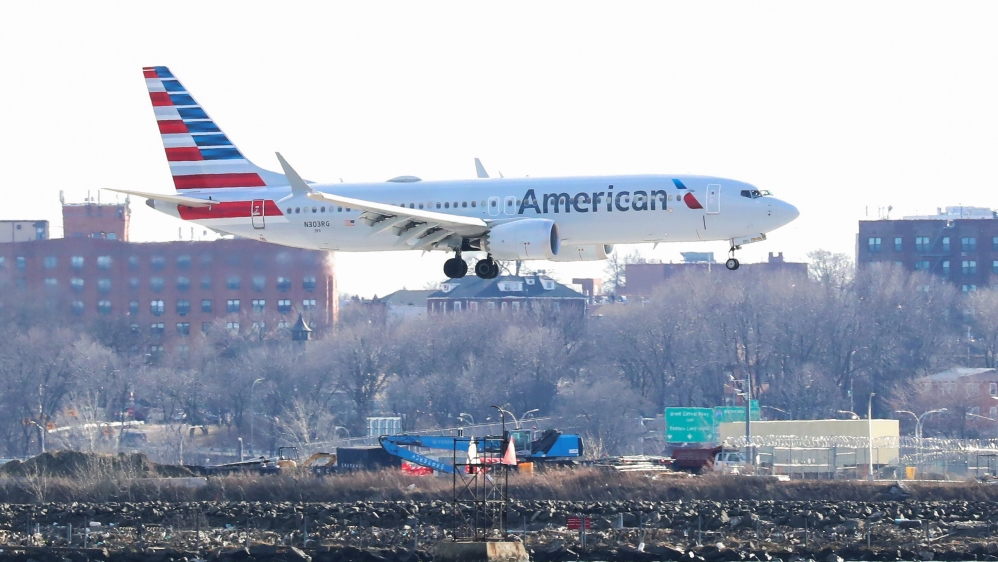Pilots and flight attendants in the United States are demanding airlines stop flying to China after health officials declared a global emergency over the rapidly spreading coronavirus, with American Airlines pilots filing a lawsuit seeking an immediate halt.
China has reported nearly 10,000 cases and 213 deaths, but the virus has spread to 18 countries, often by passengers travelling by air.
The US State Department tightened its travel advisory for China. In a notice posted on its website, it said: "Do not travel to China due to novel coronavirus first identified in Wuhan, China."The Allied Pilots Association (APA), which represents American Airlines pilots, cited "serious, and in many ways still unknown, health threats posed by the coronavirus" in a lawsuit filed in Texas, where the airline is based.
American Airlines said it was taking precautions against the virus but had no immediate comment on the lawsuit. On Wednesday it announced flight cancellations from Los Angeles to Beijing and Shanghai starting next month, but is continuing flights from Dallas.
APA President Eric Ferguson urged pilots assigned to US-China flights to decline the assignment. In a statement, the American Airlines' flight attendants union said they supported the pilots' lawsuit and called on the company and the US government to "err on the side of caution and halt all flights to and from China."
Pilots at United Airlines, the largest US airline to China, concerned for their safety will be allowed to drop their trip without pay, according to a Wednesday memo from their union to members.
United announced on Thursday another 332 US-China flight cancellations between February and March 28, though it will continue operating roundtrip flights from San Francisco to Beijing, Shanghai and Hong Kong.
The American Airlines pilot lawsuit came as an increasing number of airlines stopped their flights to mainland China, including Air France KLM SA, British Airways, Germany's Lufthansa and Virgin Atlantic.
Other large carriers have kept flying to China, but protective masks and shorter layovers designed to reduce exposure have done little to reassure crews.
A US flight attendant who recently landed from one important Chinese city said a big concern is catching the virus and spreading it to families or getting quarantined while on a layover.
"I didn't understand the gravity of the situation until I went there," she said on condition of anonymity, describing general paranoia on the return flight with every passenger wearing a mask. "Now I feel like I'm on a 14-day countdown."
Thai Airways is hosing its cabins with disinfectant spray between China flights and allowing its crew to wear masks and gloves.
Delta Air Lines is also operating fewer flights and offering food deliveries so the crew can stay in their hotels.
Korean Air Lines Co Ltd and Singapore Airlines are sending additional crew to fly each plane straight back, avoiding overnight stays.
The South Korean carrier also said it was loading hazmat suits for flight attendants who might need to take care of suspected coronavirus cases in the air.
Airlines in Asia are seeing a big drop in bookings along with forced cancellations because of the coronavirus outbreak, the head of the aircraft lessor Avolon Holdings Ltd said, adding the effect could last for some months.
The outbreak poses the biggest epidemic threat to the airline industry since the 2003 SARS crisis, which led to a 45 percent plunge in passenger demand in Asia at its peak in April of that year, analysts said.
Air France, which maintained China flights throughout the SARS epidemic, suspended its Beijing and Shanghai flights on Thursday after cabin crews demanded an immediate halt.
"When the staff see that other airlines have stopped flying there, their reaction is 'Why are we still going?'," said Flore Arrighi, president of UNAC, one of the airline's four main flight attendants' unions.
SOURCE: Reuters news agency



